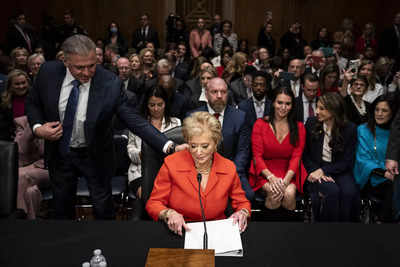Linda McMahon, Trump’s nominee for Education Secretary, recently testified before the Senate, facing tough questions about the administration’s plans to dismantle the Department of Education (DOE). McMahon, a former WWE executive and political donor, stated that she would work with Congress to shift the department’s focus toward supporting educators rather than controlling them.
She reassured lawmakers that Title I funding for low-income school districts would continue through congressional appropriations but was less clear on whether programs like the Individuals with Disabilities Education Act (IDEA) might be moved to different agencies.
Despite concerns about DOE dismantlement, McMahon expressed support for continuing and expanding Pell Grants. She suggested using Pell Grants for short-term certificate programs, providing financial aid options beyond traditional four-year college degrees. Her nomination has faced strong opposition from education groups and labor unions, leading to protests during her Senate hearing. Nevertheless, she is likely to be confirmed by the Republican-controlled Senate.
Can the department of education be shut down?
President Donald Trump has long advocated for dismantling the DOE, arguing that education policy should be left to states and local governments. However, the DOE was created by Congress in 1979, meaning it would take an act of Congress to dismantle it. A president cannot dissolve the department through executive order alone. Even with a Republican-controlled Congress, eliminating the DOE would face considerable political and logistical obstacles. Previous attempts, including those under President Ronald Reagan, failed due to a lack of support.
Will student loans be canceled?
For student loan borrowers hoping for automatic debt cancellation, the answer is likely no. Federal student loans are legally binding financial agreements between borrowers and the government, governed by promissory notes. The elimination of the DOE wouldn’t erase these obligations. Instead, the responsibilities of managing federal student loans would likely be transferred to another agency, such as the Department of the Treasury or the Consumer Financial Protection Bureau.
A major concern is the future of student loan forgiveness programs, including Public Service Loan Forgiveness (PSLF) and Income-Driven Repayment (IDR) plans. These programs are currently administered by the DOE, and if the department is dismantled, their future could be uncertain. Borrowers relying on these programs might face increased hurdles or see them eliminated entirely, despite what the soon-to-be Secretary of Education said in her Senate hearing.


